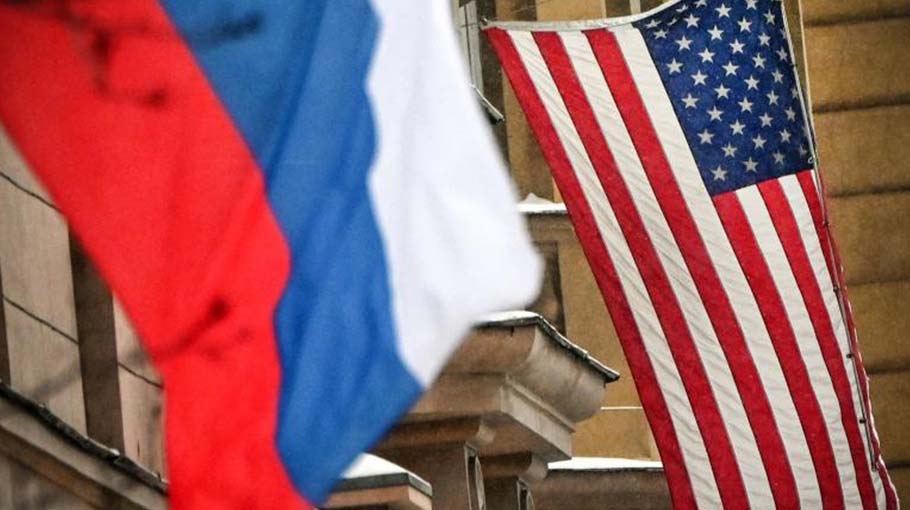US sanctions aimed at Russia could take a wide toll


The most punishing sanctions that United States officials have threatened to impose on Russia could cause severe inflation, a stock market crash and other forms of financial panic that would inflict pain on its people - from billionaires to government officials to middle-class families.
US officials vow to unleash searing economic measures if Russia invades Ukraine, including sanctions on its largest banks and financial institutions, in ways that would inevitably affect daily life in Russia.
But the strategy comes with political and economic risks. No nation has ever tried to enact broad sanctions against such large financial institutions and on an economy the size of Russia's.
And the "swift and severe" response that US officials have promised could roil major economies, particularly those in Europe, and even threaten the stability of the global financial system, analysts say.
Some analysts also warn of a potential escalatory spiral. Russia might retaliate against an economic gut punch by cutting off natural gas shipments to Europe or by mounting cyberattacks against American and European infrastructure.
The pain caused by the sanctions could foment popular anger against Russia's President Vladimir Putin.
But history shows that the country does not capitulate easily, and resilience is an important part of its national identity.
US officials are also sensitive to the notion that they could be viewed as punishing the Russian people - a perception that might fuel anti-Americanism and Mr Putin's narrative that his country is being persecuted by the West.
From Cuba to North Korea to Iran, US sanctions have a mixed record at best of forcing a change in behaviour.
Many experts on sanctions believe that the boldest sanctions against Russia's financial industry, if enacted, could take a meaningful toll.
"If the Biden administration follows through on its threat to sanction major Russian banks, which will reverberate across the entire Russian economy," said Mr Edward Fishman, who served as the top official for Russia and Europe in the State Department's Office of Economic Sanctions Policy and Implementation during the Obama administration. "It will definitely affect everyday Russians."
Mr Fishman added: "How are you going to change Putin's calculus? By creating domestic disturbances. People will be unhappy: 'Look what you did - all of a sudden my bank account is a fraction of what it was? Thanks, Putin.'"
Washington is looking to take a sledgehammer to pillars of Russia's financial system. The new sanctions that American officials are preparing would cut off foreign lending, sales of sovereign bonds, technologies for critical industries and the assets of elite citizens close to Mr Putin.
But the real damage to Russia's US$1.5 trillion (S$2.03 trillion) economy would come from hitting the biggest state banks as well as the government's Russian Direct Investment Fund, which has prominent Western executives on its advisory board.
The Treasury Department would draw from its experience targeting Iranian banks under former US president Donald Trump, though Iran's banks are much smaller and less integrated into the global economy than Russian banks.
Once the department puts the Russian banks on what officials call its "game over" sanctions list, known as the SDN list, foreign entities around the world would stop doing business with the banks, which would have a big effect on Russian companies.
The US would also enact sanctions to cut lending to Russia by foreign creditors by potentially US$100 billion or more, according to Dr Anders Aslund, an economist and an author of an Atlantic Council report on US sanctions on Russia.
Though Russia has taken steps since 2014 to rely less on foreign debt for expenses, such a loss could still devalue the ruble, shake the stock market and freeze bond trading, Mr Aslund added.
His report estimated that the 2014 sanctions reduced Russia's annual economic growth by up to 3 per cent, and new sanctions could bite much harder.
For an average Russian, the harshest US measures could mean higher prices for food and clothing, or, more dramatically, they could cause pensions and savings accounts to be severely devalued by a crash in the ruble or Russian markets.
"It would be a disaster, a nightmare for the domestic financial market," said Mr Sergey Aleksashenko, a former first deputy chairman of the Central Bank of Russia and former chairman of Merrill Lynch Russia.
He noted that the ruble had already fallen more than 10 per cent from its October value against the dollar, amid increasing talk of Western sanctions.
In a sign of the growing seriousness, officials from the National Security Council have been talking with executives from some of Wall Street's largest banks, including Goldman Sachs, Citigroup, JPMorgan Chase and Bank of America, about the stability of the global financial system in the wake of potential sanctions.
The European Central Bank has also warned bank lenders to Russia about risks if the United States imposes sanctions and has asked about the sizes of their loans.
"If the sanctions are really that momentous and Russia is fighting its biggest war since World War II on an issue of vital importance, they will likely retaliate," said Mr Samuel Charap, a former State Department official who is now an analyst with the Rand Corporation.
Mr Charap added that Moscow could conduct new cyber attacks against the US and American financial giants. The Department of Homeland Security issued a bulletin last weekend warning of Russian cyber retaliation.
"We go after their big banks," he said, "they would likely go after ours."


